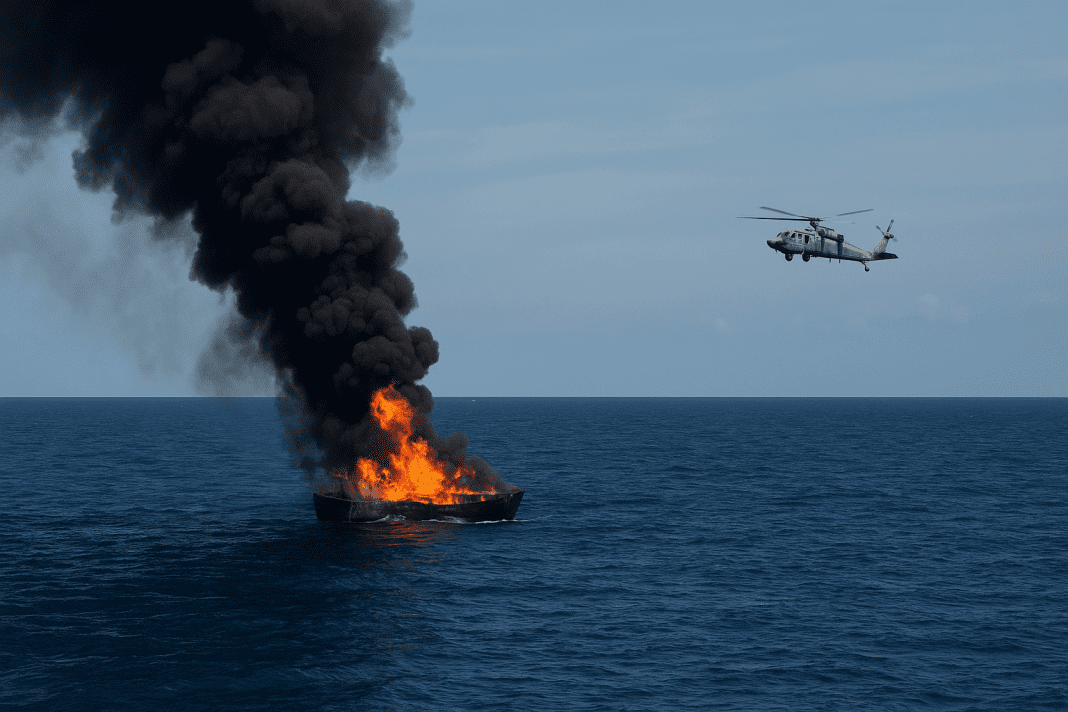The United States military has launched fresh air and sea strikes targeting four suspected drug-trafficking boats in the eastern Pacific Ocean, killing at least 14 people, according to US Defense Secretary Pete Hegseth.
US Expands Military Operations Against Alleged Narco-Boats
In a statement released on X, Hegseth confirmed that the coordinated attacks were carried out Monday under the direction of President Donald Trump. He described the targeted vessels as “known narcotics carriers” traveling through established trafficking routes.
Hegseth stated that one survivor from the strikes was rescued by Mexican authorities after the assault. The individual’s condition and current location remain undisclosed.
Video footage released by the Pentagon shows small vessels engulfed in flames following precision strikes from US aircraft and naval forces. The Defense Secretary wrote, “The department has spent over two decades defending other homelands. Now, we’re defending our own.”
Rising Death Toll and Widening Regional Tensions
This latest offensive raises the total number of deaths from the US-led maritime operations to at least 57. Previous strikes were concentrated in the Caribbean near Colombia and Venezuela, but recent missions have expanded into the Pacific, a corridor authorities say has become an increasingly critical route for cocaine shipments bound for North America.
Hegseth detailed that eight “narco-terrorists” were killed in the first strike, followed by four and three deaths in subsequent assaults. Each of the targeted vessels, he said, was confirmed through “intelligence surveillance and reconnaissance systems” as being involved in narcotics movement.
However, the campaign has sparked widespread condemnation from Latin American governments and legal scholars. Officials from Colombia and Venezuela have called the operations “extrajudicial” and “violations of international maritime law.”
Colombian Deputy Foreign Minister Mauricio Jaramillo, in a recent interview, described the strikes as “disproportionate and outside international law,” arguing that those aboard the boats had “no ability to defend themselves” and were attacked “without process or judicial oversight.”
The Venezuelan government has accused the United States of using anti-drug operations as a pretext to pursue regime change. Venezuela’s Attorney General said there was “no doubt” that the Trump administration is attempting to destabilize President Nicolás Maduro’s government and seize the nation’s vast natural resources, including oil and gold reserves.
Political and Legal Scrutiny Inside the United States
The strikes have also ignited controversy within the US Congress. Lawmakers from both major parties have questioned the President’s legal authority to order lethal strikes in international waters without congressional approval.
Trump has argued that the operations fall under his constitutional powers as Commander-in-Chief, asserting that the US “has the right to defend itself from drug traffickers operating on the high seas.” Nonetheless, he recently hinted he might seek formal authorization from Congress if future strikes target land-based facilities in Latin America.
The Defense Department maintains that all strikes are conducted in accordance with international law, citing “clear and verified intelligence” about ongoing drug smuggling operations. Yet several international law experts have warned that the campaign may set a dangerous precedent, blurring the line between counter-narcotics enforcement and acts of war.
In recent weeks, the US has reinforced its presence in the Caribbean and eastern Pacific, deploying additional aircraft, naval destroyers, and surveillance drones. The world’s largest aircraft carrier, the USS Gerald R. Ford, was ordered to the region last week to support maritime operations.
Washington has also imposed new sanctions on Colombian President Gustavo Petro, accusing him of failing to suppress drug cartels and allowing traffickers to “flourish under government negligence.”
International Condemnation and Regional Fallout
The escalating campaign has deepened rifts between Washington and several South American governments. Regional leaders have accused the US of undermining sovereignty and ignoring diplomatic mechanisms for anti-drug cooperation.
Venezuela, already under heavy US sanctions, has called the attacks “acts of aggression,” while Colombia has lodged an official protest, demanding explanations about the legal basis for the strikes.
International observers warn that the growing military footprint in Latin American waters could lead to increased instability in an already fragile region.
Meanwhile, the US administration insists that the mission is aimed solely at dismantling transnational drug networks responsible for funneling narcotics into North America. Officials argue that targeting the maritime supply chain is the most effective way to disrupt cartels before their shipments reach US shores.
The operation, described internally as Operation Sea Guard, has been ongoing for several months. Defense officials confirmed that at least four of the recent attacks took place in the Pacific Ocean—now considered a “major transit hub” for cartels seeking to avoid traditional Caribbean surveillance routes.
For now, the Pentagon has not disclosed the exact location of the strikes or the identities of the deceased individuals, citing operational security.
Unanswered Questions
As tensions mount, key questions remain unanswered. The legality of the strikes, the number of civilian casualties, and the chain of command authorizing the missions continue to draw intense scrutiny.
Analysts note that the decision to use military force against suspected drug traffickers marks a significant shift in US counter-narcotics policy—one that could have far-reaching geopolitical implications across the Americas.
Trump confirms authorizing CIA operations in Venezuela amid rising diplomatic tension
The full extent of the operation’s success, or its potential fallout, remains unclear. But for now, the Pacific and Caribbean waters have become new frontlines in Washington’s intensifying war on narcotics.

